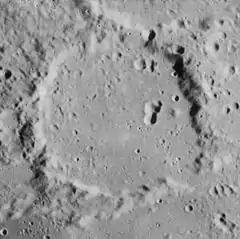Oenopides (crater)
Oenopides is a lunar impact crater that is located near the northwestern limb of the Moon, and so appears foreshortened when viewed from the Earth. This formation lies due south of the prominent crater Pythagoras, and is attached to the southwest rim of Babbage E. The southwest rim of Oenopides is part of the northern edge of Oceanus Procellarum. To the south is Markov.
 Lunar Orbiter 4 image | |
| Coordinates | 57.0°N 64.1°W |
|---|---|
| Diameter | 67 km |
| Depth | Unknown |
| Colongitude | 66° at sunrise |
| Eponym | Oenopides of Chios |
This formation is an old crater that has been heavily eroded by subsequent impacts, leaving a low outer rim that is generally hilly and contains a few clefts. There is a gap in the southeastern rim, and the level interior is attached to the lunar mare to the south. There are several small craters lying near the eastern rim, and the remainder of the floor is marked by tiny craterlets.
To the southwest is the remnant of Oenopides R, of which only parts of the rim are still protruding above the surface and the southern rim is completely missing.
Satellite craters
By convention these features are identified on lunar maps by placing the letter on the side of the crater midpoint that is closest to Oenopides.
| Oenopides | Latitude | Longitude | Diameter |
|---|---|---|---|
| B | 58.5° N | 68.6° W | 34 km |
| K | 55.8° N | 61.2° W | 6 km |
| L | 55.5° N | 61.9° W | 10 km |
| M | 55.5° N | 61.1° W | 6 km |
| R | 55.6° N | 67.9° W | 56 km |
| S | 58.1° N | 69.9° W | 7 km |
| T | 57.2° N | 68.9° W | 8 km |
| X | 57.5° N | 62.4° W | 5 km |
| Y | 57.0° N | 63.3° W | 6 km |
| Z | 58.9° N | 67.0° W | 7 km |
References
- Andersson, L. E.; Whitaker, E. A. (1982). NASA Catalogue of Lunar Nomenclature. NASA RP-1097.CS1 maint: ref=harv (link)
- Blue, Jennifer (July 25, 2007). "Gazetteer of Planetary Nomenclature". USGS. Retrieved 2007-08-05.CS1 maint: ref=harv (link)
- Bussey, B.; Spudis, P. (2004). The Clementine Atlas of the Moon. New York: Cambridge University Press. ISBN 978-0-521-81528-4.CS1 maint: ref=harv (link)
- Cocks, Elijah E.; Cocks, Josiah C. (1995). Who's Who on the Moon: A Biographical Dictionary of Lunar Nomenclature. Tudor Publishers. ISBN 978-0-936389-27-1.CS1 maint: ref=harv (link)
- McDowell, Jonathan (July 15, 2007). "Lunar Nomenclature". Jonathan's Space Report. Retrieved 2007-10-24.CS1 maint: ref=harv (link)
- Menzel, D. H.; Minnaert, M.; Levin, B.; Dollfus, A.; Bell, B. (1971). "Report on Lunar Nomenclature by the Working Group of Commission 17 of the IAU". Space Science Reviews. 12 (2): 136–186. Bibcode:1971SSRv...12..136M. doi:10.1007/BF00171763.CS1 maint: ref=harv (link)
- Moore, Patrick (2001). On the Moon. Sterling Publishing Co. ISBN 978-0-304-35469-6.CS1 maint: ref=harv (link)
- Price, Fred W. (1988). The Moon Observer's Handbook. Cambridge University Press. ISBN 978-0-521-33500-3.CS1 maint: ref=harv (link)
- Rükl, Antonín (1990). Atlas of the Moon. Kalmbach Books. ISBN 978-0-913135-17-4.CS1 maint: ref=harv (link)
- Webb, Rev. T. W. (1962). Celestial Objects for Common Telescopes (6th revised ed.). Dover. ISBN 978-0-486-20917-3.CS1 maint: ref=harv (link)
- Whitaker, Ewen A. (1999). Mapping and Naming the Moon. Cambridge University Press. ISBN 978-0-521-62248-6.CS1 maint: ref=harv (link)
- Wlasuk, Peter T. (2000). Observing the Moon. Springer. ISBN 978-1-85233-193-1.CS1 maint: ref=harv (link)